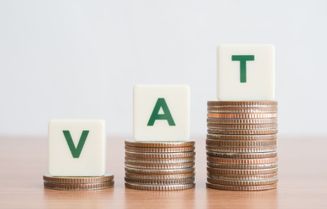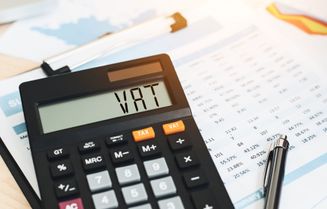VAT Audit - Complete guide for UK Business
- Modified: 18 October 2023
- 8 min read
- Tax & VAT


Gabi Bellairs-Lombard
Author
Gabi is a content writer who is passionate about creating content that inspires. Her work history lies in writing compelling website copy, now specialising in product marketing copy. Gabi's priority when writing content is ensuring that the words make an impact on the readers. For Osome, she is the voice of our products and features. You'll find her making complex business finance and accounting topics easy to understand for entrepreneurs and small business owners.
Are taxes giving you a headache? Don't worry, we've got your back! Our online tax accountants are the superheroes of financial management. They're here to make your life easier by handling complicated tax matters, like how to audit VAT and ensuring you’re compliant with HMRC regulations. We'll dive into the world of online tax accountants, exploring their seamless operations and helping you understand why they're the perfect solution for business owners looking for hassle-free VAT audits.
What Is a VAT Audit?

In the UK, a VAT audit is a necessary process to evaluate and ensure your adherence to VAT regulations. This comprehensive assessment is vital in determining three key aspects of your VAT compliance. Firstly, it verifies whether you accurately pay the correct VAT amount to HMRC (Her Majesty's Revenue and Customs). Secondly, it ensures you meet the deadlines for timely VAT payments, avoiding penalties or late fees. Lastly, the VAT audit focuses on meticulous attention to detail, ensuring you fulfil all the requirements to maintain compliance with VAT regulations. By closely following a VAT audit checklist, you can confidently navigate the complexities of VAT and ensure that your business remains in good standing with HMRC. To make your life easier, accounting services like ours can take this off your hands.
Why Do I Need a VAT audit?

For business owners in the UK, a VAT audit is a crucial step to maintain compliance and avoid potential pitfalls. The calculation of VAT can be a challenging task, particularly when you're navigating it on your own. Mistakes in VAT returns can have severe consequences, including substantial penalties or fines. A VAT audit is essential to ensure accurate calculations and timely submissions. You proactively mitigate the risks associated with incorrect VAT reporting by undergoing a VAT audit.
In addition to the importance of self-assessment, it's worth noting that HMRC frequently conducts VAT compliance checks. These checks involve compliance officers reviewing your VAT records to ensure accuracy and adherence to regulations. A VAT audit is a preemptive measure, ensuring your records are error-free before being checked. By proactively conducting a VAT audit, you can identify and rectify any potential discrepancies or errors, demonstrating your commitment to compliance and minimising the risk of facing penalties or sanctions during an HMRC check.
The VAT Audit Process With Osome
You can register a business with us and let us handle all your financial admin, ensuring you always comply with UK regulations. If you don’t know how to do a VAT audit, we’re here to help!
1 Get an Instant Quote From Us
By reaching out to our team of experienced VAT experts, you can start the process and receive a personalised quote tailored to your company's needs. All you need to do is talk with our knowledgeable professionals and provide the necessary basic documents, such as your company's financial records and VAT returns. Based on your company's yearly revenue and the audit scope required, our experts will assess and provide you with a transparent and competitive quote. With Osome's VAT audit services, you can gain peace of mind knowing that your VAT compliance is in capable hands while receiving a customised pricing solution that suits your business requirements.
2 Submit Your Documents
Once you have confirmed your engagement with Osome's VAT audit and bookkeeping services, the process becomes incredibly streamlined. To initiate the audit, we have designed a user-friendly Osome app that allows you to upload and share all the necessary documents conveniently. By using the app, you can securely submit your financial records, VAT returns, and any other relevant documentation to our team of dedicated professionals. This efficient document collection process ensures that your information is easily accessible and securely stored within our system. With the Osome app, you can enjoy a seamless experience while providing us with the necessary materials to conduct a thorough and accurate VAT audit for your business in the UK.
3 Audit Process Starts
At Osome, we prioritise efficiency and timeliness when processing your company's VAT audit and reviewing your financial documents. Once we have collected all the necessary information and documentation through our app, our team of expert auditors swings into action. They analyse and review your financial records, ensuring every detail is thoroughly examined within the required timeline. You can always expect a prompt and comprehensive VAT audit report, providing valuable insights and actionable recommendations to enhance your VAT compliance in the UK. With Osome's VAT audit services, you can trust that your company's audit will be handled professionally and efficiently, keeping you on track with your compliance obligations.
4 We Deliver Your Case Study
With Osome's VAT audit services, you can expect a comprehensive report tailored to your business needs. Our dedicated auditor conducts a thorough risk assessment, identifying areas for improvement in your VAT compliance. Our experts provide valuable recommendations for enhanced compliance and better financial practices based on the audit findings.
We understand the significance of seamless tax reporting for your business. That's why we are responsible for arranging tax reporting on your behalf and ensuring accurate and timely submissions. We aim to simplify VAT compliance and reporting, freeing you to focus on your core business operations. With Osome's VAT audit services, you can have peace of mind knowing that your business remains compliant and well-prepared for all tax-related requirements in the UK.
HMRC VAT Compliance Checklist

With this HMRC VAT Compliance Checklist, businesses can navigate VAT complexities and meet requirements to avoid penalties. We'll explore the checklist in detail, providing insights and tips to help businesses stay compliant. Osome’s VAT registration services will make sure you meet each requirement.
Sale and Purchase Invoice Requirements
When conducting a VAT audit for HMRC, it is mandatory to provide invoices that contain specific information as requested for all sales and purchases transactions. Sales invoices must include essential details such as the date and time of the sale, the transaction value, the invoice number, and the VAT amount associated with the sale. Additionally, it is important to include comprehensive information about the provided services or items, including the customer's name and address. By adhering to these requirements, businesses can ensure accurate documentation and demonstrate transparency during a VAT audit conducted by HMRC.
Accuracy of Bank Account Statements
Maintaining accuracy in your cash and bank account records is crucial during a VAT audit conducted by HMRC. It is essential to ensure that all purchases, sales, and operational expenditures are properly accounted for in your financial records. HMRC compliance officers may request to review these records as part of their assessment. It is important to note that any discrepancies identified between your bank statements and the figures reported in your VAT return may trigger a more thorough investigation or enquiry by HMRC. By diligently reconciling your bank account statements with your VAT return, you can minimise the risk of potential inquiries and demonstrate your commitment to accurate financial reporting.
Record of Previous VAT Returns
During a VAT audit conducted by HMRC, it is vital to provide a comprehensive record of previous VAT returns. VAT-registered businesses typically submit returns every quarter, and it is essential to maintain and retain all relevant records about each filing. These records must be readily available for inspection by HMRC. Typically, HMRC compliance officers will examine your most recent VAT return along with the returns from the preceding 12 months. Any irregularities or anomalies detected in these records may prompt a closer review or investigation. By keeping meticulous records and ensuring their accessibility, you can effectively meet the requirements of a VAT audit and demonstrate your commitment to compliance and accurate reporting.
How Many Types of VAT Audits Are There?
Various types of VAT audits exist, and the level of thoroughness can vary. Tax authorities may impose the following audits on taxable entities:
- Desk verification: An annual review of a company's income tax and VAT returns, where the tax office verifies the provided information against VAT, customs, and income tax records.
- VAT refund audits: Verifying a VAT refund claim, typically examining the specified period mentioned in the claim.
- Registration checks: Spot checks are carried out to ensure businesses comply with VAT registration requirements and maintain proper VAT record-keeping. These checks are usually conducted on smaller businesses.
- Comprehensive audits: Triggered by anomalies, the tax authority performs a thorough audit covering multiple years of business operations. It may uncover further noncompliance, potentially leading to a more extensive investigation.
Additionally, tax authorities may initiate fraud investigations when there are suspicions of deliberate VAT or income tax evasion. These investigations involve comprehensive criminal procedures, including interrogations, property seizures, and other measures.
How Do I File a VAT Audit Report Online?

VAT auditing by the National Bureau of Revenue (NBR) ensures compliance with regulations and validates the consistency between declared VAT amounts and payments made by taxable individuals.
The NBR utilises the Audit File to conduct VAT return audits, which contain detailed information such as base amounts, calculated tax amounts, and chronological records of taxable transactions. The Audit File includes essential data like invoice numbers, dates, client/supplier names, VAT amounts, and invoice totals (inclusive and exclusive of tax).
To compile an audit report, you must compile the company’s financial data in a Content Separated Value (CSV) format, including invoice numbers and dates, client/supplier names, VAT payments, and invoice amounts. With Osome, generating your VAT Audit Report becomes effortless and automated.
What Is a VAT Audit Report?
Introduced in the UK in 1973, Value Added Tax (VAT) is a tax imposed on the purchase price of various goods, services, and items bought and sold within the United Kingdom, similar to the VAT system in the European Union.
A VAT diagnostic, commonly called a VAT Audit, is conducted to ensure compliance by looking at the flow of products and invoices. This audit may encompass a comprehensive analysis of a company's financial records, reviewing and comparing purchase and sales ledger movements. By conducting a VAT audit, businesses can mitigate the risk of a tax audit. Failing to understand and fulfil VAT obligations accurately can pose significant financial risks, including incorrect submission of VAT documents or non-compliance with current regulations. Therefore, a VAT audit becomes crucial in reducing risks and maintaining compliance with VAT requirements.
Get expert tips and business insights
By clicking, you agree to our Terms & Conditions,Privacy and Data Protection Policy
We’re using cookies! What does it mean?






